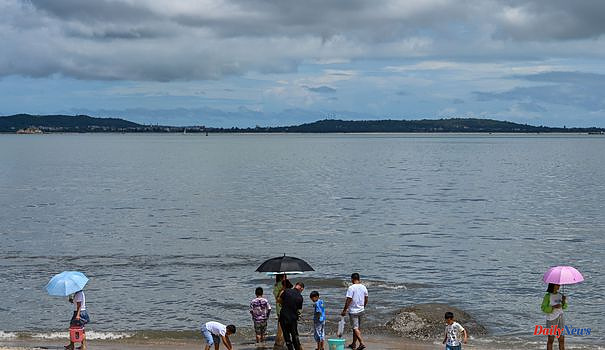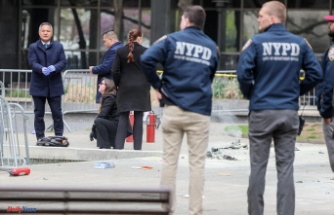If her trip to this territory claimed by China lasted less than 24 hours, Ms. Pelosi sparked the fury of Beijing by being the highest elected American official to visit Taipei in 25 years.
Assuring to come "in peace" to the region, Ms. Pelosi however hammered that the United States would not abandon the island, ruled by a democratic regime and which lives under the constant threat of an invasion by the Chinese army.
“Those who offend China must be punished, ineluctably,” retorted Chinese Foreign Minister Wang Yi from a distance.
In response, Beijing is launching from noon Thursday (0400 GMT) vast military exercises in several areas around the island of Taiwan, at the level of busy trade routes.
They include "training activities, including live ammunition firing drills," according to state media. As a security measure, the Chinese Maritime Security Administration has "prohibited" ships from entering the affected areas.
These exercises will take place in a variety of areas encircling Taiwan - sometimes just 20 kilometers from the Taiwanese coast - and will last until Sunday noon.
- "Self-defense" -
Authorities on the island have denounced the program, saying it threatens East Asian security.
"Some of China's maneuver areas encroach on...Taiwan's territorial waters," said Sun Li-fang, spokesman for the Taiwanese Defense Ministry.
"This is an irrational act aimed at challenging the international order," he said.
"There is no justification for using a visit as a pretext for aggressive military activities in the Taiwan Strait", estimated for their part the heads of diplomacy of the rich countries of the G7 (United States, Japan, France, Germany , Italy, Canada, UK) in a joint statement. “Travelling abroad is normal and part of the routine for parliamentarians in our countries,” they added.
Beijing says for its part that these exercises - as well as others, more limited, started in recent days - are "a necessary and legitimate measure" after Ms. Pelosi's visit.
"It is the United States who are the provocateurs, and China who is the victim. China is in self-defense," Hua Chunying, a spokeswoman for the Ministry of Foreign Affairs, told reporters.
If the hypothesis of an invasion of Taiwan, populated by 23 million inhabitants, remains unlikely, it has increased since the election in 2016 of the current president Tsai Ing-wen.
Coming from an independence party, Ms. Tsai refuses, unlike the previous government, to recognize that the island and the continent are part of “one China”.
Visits by foreign officials and parliamentarians have also increased in recent years, provoking the ire of Beijing.
In response, President Xi Jinping's China, which wants to be intractable on questions of sovereignty, seeks to isolate Taiwan diplomatically and exerts increasing military pressure on the island.
- "Clear escalation" -
Result: the Taiwan Strait is now becoming the scene of dangerous tensions between the United States, the Taiwanese authorities and the Chinese authorities, forced to project an image of intransigence as the Chinese Communist Party (CCP) congress approaches.
Organized in the fall, this congress will see, except cataclysm, Xi Jinping re-elected at the head of the organization for a third term.
However, China has no desire for the current situation to degenerate, experts told AFP.
"They are cautious and don't want any uncontrolled escalation," Chong Ja Ian, a security specialist at the National University of Singapore, told AFP. "There are limits to what they are willing to do."
"An accidental war 'triggered by an incident' is the last thing Xi Jinping wants" before the CCP congress, says Titus Chen, professor of political science at National Sun Yat-Sen University in Taiwan
For Amanda Hsiao, China analyst at the International Crisis Group think tank, these military exercises which begin Thursday "represent a marked escalation compared to the norm of Chinese military activities around Taiwan and the last crisis of the Taiwan Strait in 1995-1996. ".
"By doing so, Beijing indicates that it rejects any sovereignty" of the Taiwanese authorities on the island, she underlines.












